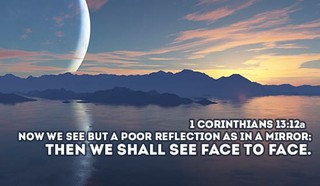- Recent Translations
- All Translations
1 Corinthians 13:12
Share
Settings
1 Corinthians 13:12 Meaning and Commentary
For now we see through a glass
In this present life, they that are enlightened by the Spirit of God, see God, the perfections and glory of his nature, the riches of his grace and goodness, as displayed in Christ; they behold the glory of Christ, as full of grace and truth, and are filled with love to him; the desires of their souls are after him, and they are changed into the same image by his Spirit; they discern the things of the Spirit of God; the veil being removed from them, they behold wondrous things, out of the law of God and Gospel of Christ, even such things as are unseen unto, and unknown by the natural man: but then it is all "through a glass"; not of the creatures; for though the invisible things of God may in some sort be seen and understood by the things that are made; and God, as the God of nature, may be seen in the works of creation and providence, yet not as the God of grace; it is only in his Son, and through the glass of the Gospel, he is to be beheld in this light: and so it is through the glass of the word and ordinances, that the glory of the person of Christ, of his offices, fulness of grace and righteousness, is only to be seen; in these he is evidently set forth to the eye of faith, as the surety, Saviour, and Redeemer of his people, and through these the knowledge of divine truths is communicated: and through all these but
darkly:
"in an enigma", or "riddle", or "dark saying", as the word here used may be rendered; that is, in this present state, in comparison of the future one; for though the sight of things under the Gospel dispensation is clear, and with open face, in comparison of the legal one, yet even this is very obscure, and attended with great darkness and imperfection, when compared with the beatific vision in heaven, which will have no manner of interruption and obscurity in it:
but then face to face:
there will be no intervening mediums of vision; not the glass of the word and ordinances; there will be no need of them, God and Christ will be seen as they are; the judgments of God, his providential dispensations, will be all made manifest, and will be legible without the help of a glass; the doctrines of grace and truth will lie open and clear, free of all dark speeches, obscure hints, or enigmatical expressions: and as there will be nothing to intervene by way of assistance, there being no need of any, there will be nothing to intercept the sight; the objects will be nigh, even face to face; the view will be full and clear, the sight will be perfect, as well as the converse with the objects will be familiar; and which, without the least obstruction, will always so continue: there seems to be here a double reference, partly to what the Lord says of Moses, in ( Numbers 12:8 ) "with him will I speak, mouth to mouth, even apparently, and not in dark speeches"; and partly to what the Jews say of him, with a view to the same passage:
``all the prophets (say they F19) looked through a glass, which did not give light; (or, as they sometimes say, which was spotted, and was not clear;) Moses our master looked (hryamh ayrlqpoyab) , "through a glass that gave light";''or, as elsewhere, was bright and clear, and without any spot. Again, they say F20,
``all the prophets prophesied by the means of an angel; hence they saw what they saw (hdyxw lvmb) , "by way of parable and riddle", or dark saying; Moses our master did not prophesy by the means of an angel; as it is said, "with him will I speak mouth to mouth"; and it is said, "the Lord spake to Moses, face to face"; and it is also said, "the similitude of the Lord shall he behold"; as if it was said, that there should be no parable; but he should see the thing clearly without a parable; of which likewise the law testifies, saying, "apparently, and not in dark speeches"; for he did not prophesy (hdyxb) , "by way of riddle"; (in an enigmatical way, darkly;) but apparently, for he saw the matter clearly.''The two glasses, clear and not clear, the Cabalistic doctors call "tiphereth" and "malchuth" F21.
``"Tiphereth" (they say) is a clear and well polished glass, by which Moses prophesied and had visions, "and saw all things most exactly", in a very singular manner; "malchuth" is the glass that is not clear; so that he that prophesies by that, prophesies "by riddle", and parable.''Now the apostle suggests, that as there was such a difference between Moses and the rest of the prophets, the one saw clearly, the other through a glass darkly; a like, yea, a much greater difference there is between the clearest views saints have of divine things now, and those they shall be blessed with hereafter, and which he exemplifies in himself:
now I know in part;
though not a whit behind the chief of the apostles; though his knowledge in the mystery of Christ was such, as had not been given to any in ages and generations past; and though he had been caught up into the third heaven and had heard words not lawful to be uttered, yet owns his knowledge in the present state to be but imperfect; which may be instructive to such, who are apt to entertain an high opinion of themselves, and dream of perfection in this life:
but then shall I know, even as I am known;
in the other world and state, he signifies that he should know God, Christ, angels, and glorified saints, and all truths in a perfect manner, even as he was known of God and Christ perfectly, allowing for the difference between the Creator and the creature; his sense is, that he should have as full and complete a knowledge of persons and things as he was capable of; it would be like, though not equal to, the knowledge which God had of him; and which would be attended with the strongest love and affection to the objects known, even as he was known and loved of God.
F19 T. Bab. Yebamot, fol. 49. 2. Vajikra Rabba, sect. 1. fol. 147. 2. Zohar in Gen. fol. 30. 2. & 98. 3. & 103. 3. & in Exod. x. 3. & xi. 3. & xiv. 4. & 34, 2. Tzeror Hammor, fol. 46. 4. & 170. 2. Shaare ora, fol. 26. 2.
F20 Maimon. Jesode Hatora, c. 7. sect. 6.
F21 Lex. Cabal. p. 139. R. Moses in Sepher Hashem in ib.


